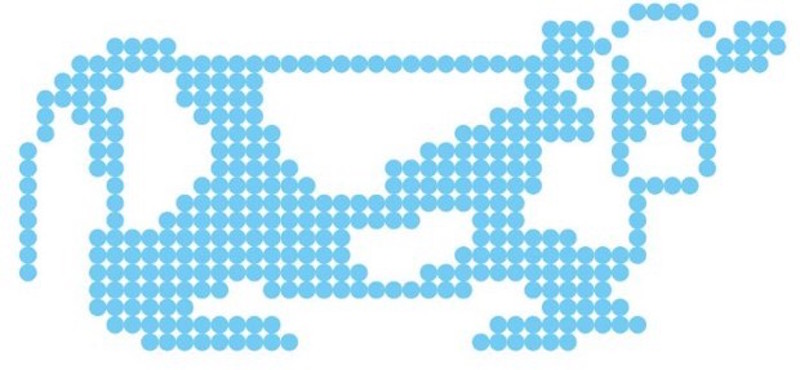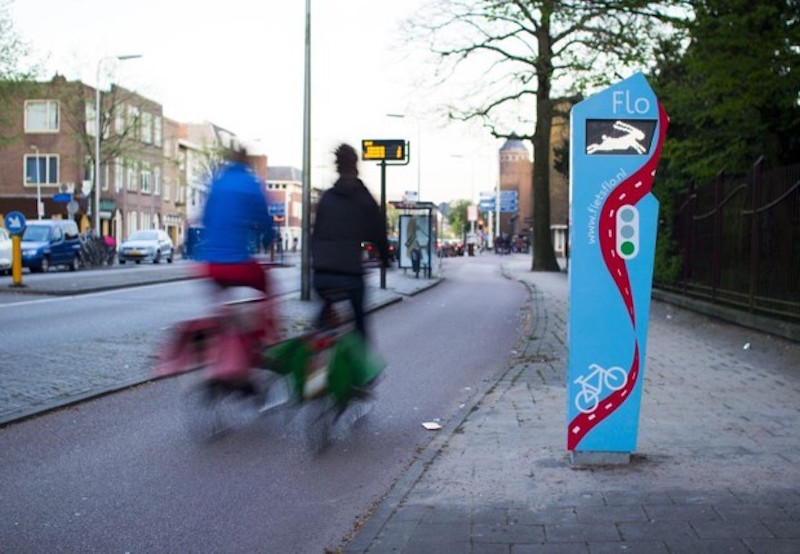
Utrecht, the fourth largest city in the Netherlands, is a cyclist’s dream. Unlike other urban areas that confine riders to tiny lanes, cyclists here get priority with dedicated “bicycle streets” where cars are considered “guests,” as well as special bike tunnels and bridges. The city is also in the process of constructing the world’s biggest indoor parking lot for bikes at its central train station. However, the over 60 percent residents who use the two-wheelers as their primary mode of transportation are still frustrated because, like cyclists all over the world, they have to make constant stops at traffic lights.
To ease their pain, Jan-Paul De Beer, head of local design firm Springlab, has come up with an ingenious solution — electronic kiosks that help riders sync up their speed with the onset of a green light. The tall blue structures, called Flo, are strategically placed about 120 meters (393 feet) before a traffic signal. They capture the rider’s speed using a radar and let him/her know whether to slow down, pedal harder, or maintain the same pace.

Flo’s first prototype featured LED lights that would light up in sequence to show the ideal speed. However, this turned out to be dangerous since riders began focusing more on the lights than on the road ahead. But since people seemed to enjoy the idea of “outsmarting the traffic signals,” the designers decided to incorporate a fun gaming experience in the next version.
When a fast rider zips past a Flo kiosk, it will signal him to slow down by displaying a tortoise. Conversely, a slow cyclist will be encouraged to pick up the pace by a hare, while those cruising along at the perfect speed will be rewarded with a thumbs up! Whenever possible, Flo also communicates with the traffic lights to turn them green allowing the cyclist to breeze through. In cases where the red light is inevitable, Flo will flash the image of a cow, letting the rider know that he/she has little choice but to wait it out.

De Beer says, “We chose animals because a hare and a turtle are universal symbols for high speed and slow pace. A cow, however, is a new symbol, because we couldn’t find a playful, widely known symbol for waiting. We chose a cow because when you go on holiday to France, which every Dutchman does, you often find yourself waiting for cows blocking the road.”
The innovative traffic kiosk is currently being tested at Utrecht’s busy Amsterdamsestraagwet intersection where a large number of bicycle accidents occur each year. If all goes well, Springlab hopes to install the fun traffic helpers throughout the city’s busy intersections. Flo has also been installed for testing in the neighboring town of Eindhoven. “We just launched in the Netherlands, but it’s [Flo] also available for international use,” De Beer says. “We want to help cyclists all over the world.”

Flo is not the first novel idea to help encourage more bikers in the Netherlands. In late 2015, transportation officials in the city of Rotterdam, which boasts over 360 miles of bike lanes, installed “regensensors,” or rain sensors, in the lights at the city’s busiest intersections. At the slightest sign of moisture, the sensors direct the red traffic lights to turn green every 40 seconds, instead of the standard 3 minutes, allowing bikers to escape the rain as fast as possible.
Resources: Fastcompany.com,mnn.com,nltimes.com